
Renewable energy sources contact point in Slovenia (RES OSS)

About this good practice
Before its implementation, there was no centralized system to guide renewable energy (RES) investors, resulting in fragmented and inefficient processes with little support for RES project investments. Potential investors struggled with accessing subsidies, navigating administrative requirements, and implementing projects.
To address this issue, 35 RES OSS, managed by Borzen (Slovenian electricity market operator) and supported by local energy agencies like LEASP, were established to:
- Provide expert guidance on RES project implementation.
- Assist in obtaining necessary permits and accessing support programs.
- Streamlining administrative processes to encourage renewable energy investments.
- The initiative operates through a network of 16 advisory offices strategically located across Slovenia. These offices offer personalized consulting services while leveraging a centralized IT system for monitoring, reporting, and knowledge sharing. The model ensures consistency in service delivery and accessibility for all stakeholders.
Stakeholders: Borzen (responsible for management), local energy agencies (operating the OSS), ministries, and utility companies.
Beneficiaries: Residents, private sector (including tourism sector), and public sector entities with RES investment intentions. By addressing their specific needs, the initiative aims to foster sustainable economic growth and reduce carbon emissions.
Resources needed
Human Resources: 2 - 4 consultants per OSS location, totalling 50 experts across Slovenia.
Infrastructure: Offices and IT systems for reporting, monitoring, and centralized support.
Financial Resources: Primarily funded by national (taxes from the electricity bill) and EU programs.
Evidence of success
Simplified administrative processes have greatly improved the efficiency of renewable energy projects, leading to increased investments across all sectors. Greater transparency and predictability in procedures have boosted investor confidence. A key long-term success factor is aligning with the EU 2030 sustainability goals.
The first OSSs launched in June 2024, and by year-end, 1,077 consultancy services were provided, with 500 leading to continued investment.
Potential for learning or transfer
The OSS model is an exemplary framework that can be adapted and implemented in other regions seeking to accelerate renewable energy adoption (according to the Directive 2018/2011). Key success factors include:
- Holistic Approach: Combining administrative guidance, technical expertise, and subsidy navigation under one roof.
- Scalable Framework: Flexibility to expand services to accommodate diverse renewable energy technologies and growing demand.
- Collaborative Governance: Strong partnerships among government agencies, local authorities, and private stakeholders ensure comprehensive support and sustainability.
Regions aiming to replicate this model should focus on establishing a robust institutional framework, ensuring skilled human resources, and leveraging digital tools for streamlined operations.
Further information
Website
Good practice owner
You can contact the good practice owner below for more detailed information.

Local energy agency Spodnje Podravje
